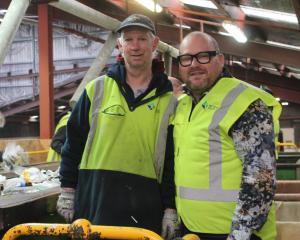Gus Morton says the pork industry is at a crossroads.
Since Christmas, the schedule has retracted 50c a kg on average and farmers were in "a hell of a deficit" per pig.
While pork could exceed an "absurd" $20 a kg in the supermarket, the current top-end of the schedule was $3.05-$3.15, with various deductions still to come out of that, he said.
Mr Morton, who has 30 years' experience in the pork industry, estimated a good average would be about a $40 per head loss, per pig going out the farm gate.
His concerns were echoed by fellow long-time pig farmer, Pieter Bloem, from Dunedin, who described the situation as "pretty diabolical".
The Bloems' income was down $4000 a week since January and "it wasn't even all that flash before that".
"There's not many good reasons to get out of bed in the morning at the moment," Mr Bloem said.
While the retail price was beyond the control of farmers, there was "more than enough fat in the system" for everyone, when looking at the price farmers were being paid to what the retail price was, Mr Morton said.
He questioned how the schedule could claw back to a positive situation.
It would be foolish to think the retail price would have to go up for farmers to get an increase in the schedule, he said.
"For too long, we've just been drifting along with no real direction.
"All of a sudden, because there's so many different things competing for the dollar, we've fallen behind.
We've fallen off the pace big time."
Farmers were doing their best to comply and meet requirements but were in a deficit situation.
"To farm in the modern financial environment, you can't farm on a day-to-day basis.
"You have to have strategies in place with projections so you know where you're tracking."
In any business, there had to be accountability but that was lacking in the industry, he said.
"We're all sensible enough to realise that business is business.
"At the end of the day in the value chain, where business is business, everybody actually has to be making money."
The industry needed some "serious direction" around it.
"I don't know what it's going to take for the farmers to become united.
"I would have thought 50c a kg out of their bottom line would have been enough to kick-start something.
"You can't bury your head when you're in a deficit situation. It's a very, very challenging situation," Mr Morton said.
Mr Bloem agreed the industry was "definitely drifting" and there was very little money for upgrading work.
Pig farms needed constant upgrading and reinvestment, even without new buildings, and there were often "massive" difficulties obtaining resource consents.
Sows were being culled from herds supplying his wholesaler and a large percentage were outdoor breeding sows, he said.
Producers with free-range breeding operations only received a premium on a percentage of their throughput, dependent on volumes that got sold into that free-range market, he said.
Mr Bloem believed that, combined with lower productivity and premiums on a percentage basis, combined with the competition from dairy farmers for land, especially if it could be irrigated, was making pig farming outdoors "very unattractive".
Another aspect to the sow cull was that they were mostly weaner producers that sold to contract finishers and those finishers had discontinued fattening because of "non-existent" margins, so weaner producers were suddenly left with no market.
On a more positive note, he was impressed with NZPork's new marketing campaign, Extraordinary Kitchen, which included the involvement of celebrity chef Simon Gault:
"It seems to be making quite an impact already."
The new initiative targets consumers via in-store and online activity, including Facebook and YouTube, with a campaign to educate and inspire consumers on how to create easy meals using 100% New Zealand Pork.
Steve Glass, managing director of Canterbury-based specialist pork meat wholesaler FreshporkNZ, said it was "definitely tough times" for pig farmers, as the schedule dropped and feed costs rose.
Some farmers were exiting the industry or reducing sow herd size, he said.
When contacted, NZPork chairman Ian Carter, who is also a North Otago pig farmer, said the negative cash-flow position was recognised throughout the industry.
It was probably not uncommon for a lot of businesses, given the current economic climate, although other primary products had experienced a lift, which had not been seen in the pork industry, Mr Carter said.
Retailers have noticed a drop in general protein consumption and were not selling the same volumes.
While they were making margins on pork, he personally believed they were doing what they had to do to operate their business.
While it was easy to criticise them, the industry still needed them.
The situation reflected the state of the economy to some degree, he said.
He believed there had not been enough done as an industry to change the product range to meet the needs of modern consumers.
That was now being addressed, although maybe later than it needed to be.
Strategies were being put in place and the new marketing campaign would hopefully stimulate an increase in sales and demand.
Extraordinary Kitchen was the boldest marketing campaign seen within the industry for some years, he said.












